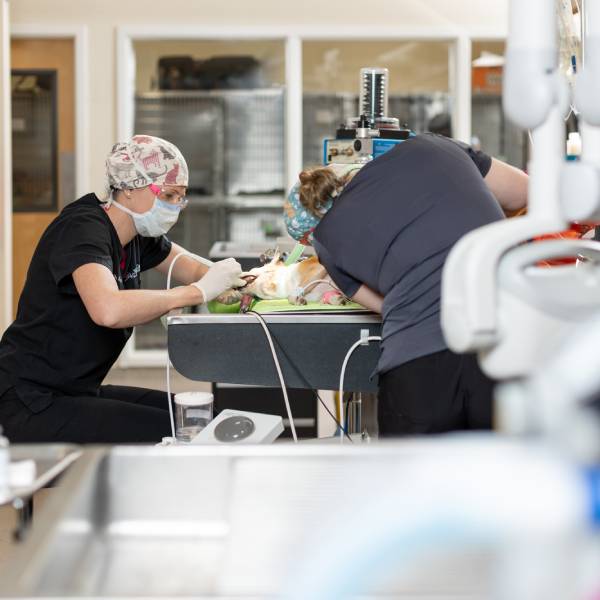Veterinary Dentistry at MCAH
Protecting your pet’s comfort, health, and quality of life.
Dental health is more than clean teeth—it’s a key part of your pet’s overall wellness. Left untreated, dental disease can cause chronic pain, damage internal organs, and shorten your pet’s life. At Mount Carmel Animal Hospital, we take a proactive, medically grounded approach to dental care—using advanced tools and clinical expertise to diagnose problems early and treat them effectively.
Why Dental Health Matters
Just like in humans, most dental disease in pets occurs below the gum line, where it isn’t visible to the naked eye. That’s why we go far beyond brushing and surface cleaning.
Bad breath isn’t just unpleasant—it’s often the first sign of underlying infection. Bacteria in the mouth can lead to tartar buildup and gum inflammation, which allows harmful toxins to enter the bloodstream. These toxins can strain the organs that filter blood—like the heart, liver, and kidneys—impacting your pet’s long-term health and vitality.
In fact, more than 80% of pets over the age of three have some form of periodontal disease—often without obvious symptoms.
Signs of Dental Disease
Early-stage gum disease is often silent, but as it progresses, you might notice:
- Bad breath
- Bleeding gums
- Loose or broken teeth
- Swelling of the mouth or face
- Difficulty chewing or dropping food
- Excessive drooling
- Head shyness or mouth sensitivity
If you notice any of these signs, our team is here to help.
Advanced Diagnostics & Treatment
As part of your pet’s annual wellness exam, our veterinarians perform a thorough oral exam to assess dental health. If we detect signs of dental disease, we’ll talk with you about next steps and recommend the most effective treatment options.
For many pets, this means a professional dental cleaning under anesthesia—the only way to fully clean beneath the gums and remove hardened tartar and plaque. MCAH is equipped with state-of-the-art dental tools, including digital dental X-rays, which allow us to see what’s happening below the surface and catch issues early.
Not all practices use dental X-rays—but we believe they are essential to proper care.
What to Expect: Professional Dental Cleaning
A typical dental procedure takes 1–2 hours and is performed under general anesthesia to keep your pet safe and comfortable.
Every procedure includes:
- Pre-anesthetic bloodwork to ensure your pet is healthy enough for anesthesia
- Intubation and a closed breathing system to prevent aspiration of bacteria
- Full-mouth dental X-rays
- Evaluation of all teeth and gums
- Cleaning and polishing above and below the gum line
- Tooth extractions when necessary
- Suturing of gums following extractions, when indicated
Throughout the process, your pet’s safety, comfort, and health are our top priorities.
About Anesthesia in Veterinary Dentistry
Safe, stress-free care that protects your pet’s health.
We understand that anesthesia can be a concern—but it’s a vital part of safe, effective dental care for pets. At MCAH, we follow protocols that prioritize your pet’s comfort, safety, and wellbeing every step of the way.
Why Is Anesthesia Necessary?
Unlike people, pets don’t understand what’s happening during a dental procedure. Even the gentlest pet can become anxious, try to move, or react defensively—especially when sharp instruments are involved.
Anesthesia allows us to:
- Perform a thorough cleaning without causing stress or discomfort
- Take high-quality dental X-rays (which require complete stillness)
- Safely inspect and treat areas below the gum line—where most dental disease begins
- Prevent injury to your pet and our team
With your pet fully anesthetized, we’re able to work safely, precisely, and pain-free.
Is Anesthesia Safe?
While all medical procedures carry some risk, modern veterinary anesthesia is safer than ever before. At Mount Carmel, we take every precaution to protect your pet, including:
- Pre-anesthetic bloodwork to assess organ function
- Personalized anesthetic plans based on your pet’s age, breed, and medical history
- Continuous monitoring by our trained technician team throughout the procedure
What About “Anesthesia-Free” Dental Cleanings?
The American Veterinary Dental College strongly advises against anesthesia-free cleanings. These procedures:
- Do not allow cleaning or evaluation beneath the gum line
- Miss early signs of dental disease
- Increase the risk of injury to your pet or the person performing the cleaning
- Provide a false sense of security while leaving serious problems untreated
That’s why MCAH provides only comprehensive, medically sound dental care—because your pet deserves the best.
Home Dental Care for Pets
Simple steps at home can make a big difference.
The most effective way to support your pet’s dental health between professional cleanings is regular tooth brushing. We know—it’s easier said than done. But with patience, consistency, and the right tools, you can help prevent plaque buildup, reduce bad breath, and protect your pet’s long-term health.
Start early if you can—introducing brushing during puppyhood or kittenhood helps build lifelong habits. Use a soft-bristled toothbrush (a child’s toothbrush or one made for pets) and only use toothpaste designed specifically for animals. Human toothpaste contains ingredients that are unsafe for pets.
At-Home Dental Products We Recommend
At MCAH, we carry a curated selection of veterinary-recommended dental products that meet our standards for safety and effectiveness. These include:
- Pet-specific toothbrushes and toothpastes
- Dental chews and treats
- Water additives
- Prescription dental diets
With so many products on the market claiming to “clean” your pet’s teeth, it’s easy to feel overwhelmed. Our team is here to help you choose the options that will actually make a difference for your pet.
We’re Here to Help
Just like with human dental care, the best results come from a combination of professional cleanings and daily prevention. During your visit, we’ll walk you through home care tips and demonstrate techniques using toothpaste, chews, and oral rinses—so you can feel confident caring for your pet’s teeth at home.
FAQs
How do I know if my pet needs dental care?
Bad breath, tartar buildup, red or bleeding gums, loose teeth, drooling, and difficulty eating are common signs of dental disease. However, many pets show no obvious symptoms in early stages. That’s why regular dental exams and cleanings are essential for prevention.
How often should my pet have a dental cleaning?
Most pets benefit from a professional cleaning once a year, but the ideal frequency depends on your pet’s age, breed, health status, and oral condition. During wellness exams, we’ll evaluate your pet’s teeth and help determine the right schedule.
Is dental disease really that serious?
Yes. Dental disease can cause chronic pain, tooth loss, and infections that affect the heart, liver, and kidneys. Keeping your pet’s mouth healthy protects their overall health and can extend their lifespan.
Is anesthesia safe for my pet?
Modern veterinary anesthesia is very safe, especially with the protocols we follow at MCAH. We perform pre-anesthetic bloodwork, customize your pet’s anesthesia plan, and monitor them closely throughout the procedure.
What’s wrong with anesthesia-free dental cleanings?
They don’t treat disease below the gum line, which is where most problems occur. They also increase the risk of injury to your pet and don’t allow for proper diagnosis or treatment. The American Veterinary Dental College does not recommend them, and neither do we.
Can I really brush my pet’s teeth at home?
Yes—and it’s the best thing you can do between professional cleanings. It takes practice and patience, and starting while your pet is young is very helpful. We can recommend pet-safe toothpaste, chews, rinses, and other tools to help support your pet’s dental health.
Does my pet need dental X-rays?
Yes, in most cases. More than half of dental disease happens below the gum line, where it can’t be seen. Dental X-rays help us diagnose infections, bone loss, fractures, and other issues early—so we can treat them before they become serious.

